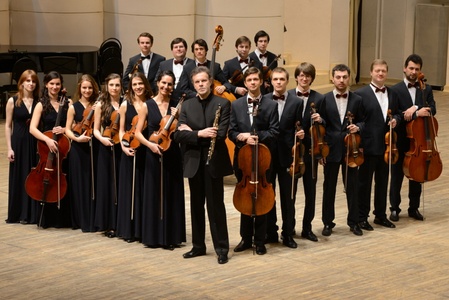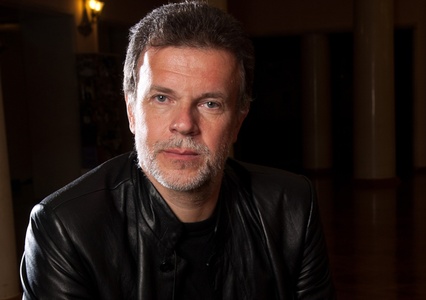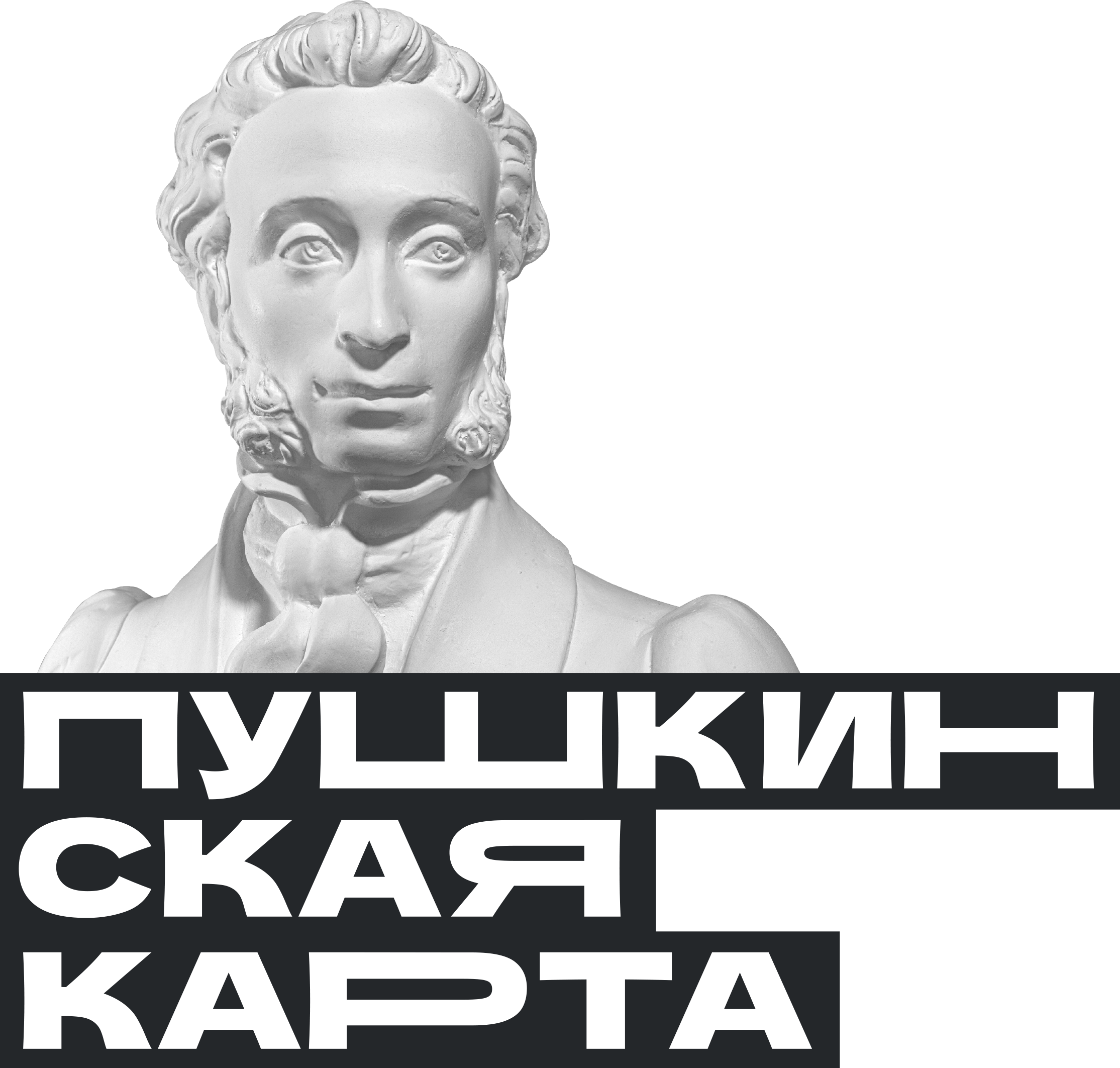Dedicated
to the 70th Anniversary of the Great Victory
May 10, 2015
Rachmaninov Concert Hall (Philharmonia-2)
directions to the hallState Chamber Orchestra of Russia
Alexey Utkin, conductor
Russian State
Television
and Radio Broadcasting Company
Children's Choir
Program:
Hans Krasa
“Brundibar". Children's opera
originally performed
in
Theresienstadt concentration camp
Russian libretto
by Lilia Vinogradova
Stage director – Mstislav Pentkovskiy

Brundibár (the name comes from a Czech colloquialism for a bumblebee) is an opera, written for children in1938 by Hans Krása with lyrics by Adolf Hoffmeister, as an entry for a children’s opera competition. "Brundibar" was performed more than 50 times at Theresienstadt, with a cast of imprisoned children. After that it gained worldwide fame becoming a symbol of resistance against the evils of fascism.
Due to the increasing popularity in recent years this opera has been performed in Europe, Australia, and the United States. Brundibar will be first staged in Moscow, and it will be performed in Russian.
Theresienstadt concentration camp was designated as a 'model ghetto' and was supposed to be used as a propaganda tool by the Nazis. Prominent and most talented Jewish musicians, scientists, diplomats, artists, and writers were imprisoned there. All this created conditions for an extremely rich cultural life in Terezin that consisted of concerts, recitals, stage performances, lectures, etc.
In 1943 the SS decided to demonstrate Theresienstadt to the Red Cross as a 'model settlement'. Trying to hide the fact of overcrowding of Theresienstadt the Nazis deported thousands of people to Auschwitz. On June 23, 1944 the Red Cross delegation visited a school, a theater, a hospital, cafes, a kindergarten, and also attended a performance of the 'Brundibar opera'. This was the last of the fifty-five performances in the Terezin ghetto. Several days later, the deportation of the artists silenced the most popular production in Terezin.
'Brundibar' performance history cannot be traced from 1944 to 1975. Thanks to the efforts of Joža Karas, a Polish-born Czech violinist living in the United States, 'Brundibar' was introduced to the English-speaking world, premiering in the United States in 1975, with the English premiere in 1977 in Canada and the German premiere taking place in 1985. Karas and his wife Milada provided the first English translation, published by Tempo Praha in 1993 (revised in 1998).
In 1995 the organisation 'Jeunesses Musicales Deutschland' established 'TheBrundibár Project', an intergenerational undertaking involving invited eyewitnesses who could tell the young actors about their past. Moreover, a CD with Krása’s music, a video with interviews from surviving performers and clips of Brundibár performances were released. Teachers and students received research materials about Nazi Germany, Terezín and the 'model' ghetto’s cultural programs. 'The Brundibár Project' generated hundreds of performances of the opera in Germany and Eastern Europe from 1999 onwards, taking place also in the United States, the United Kingdom and other countries
A more recent development in the Brundibár story has been an alternative English adaptation by Tony Kushner for the Chicago Opera production of 2003. In 2015 the 'Brundibar' opera was performed in Teatro Regio, Turin ( January, 27-28), Southbank Centre, London (February, 13-14), Opera Dijon (February, 16-20), and in a number of theaters in Germany.
In 2015, to mark the 70th Anniversary of the great victory, one of the preeminent Moscow concert venues, Philharmonia-2, the brand new Concert Hall, will host the 'Brundibar' opera performance, which is scheduled for Sunday, May 10, 2015.
The opera will be performed by the State Chamber Orchestra of Russia (conductor - Alexey Utkin), the soloists of the Academy of Choral Art, and the All-Russian State Television and Radio Broadcasting Company Children's Choir.
The russian translation of 'Brundibar' is provided
by a famous poet, lyricist, Lilia Vinogradova (writes the lyrics in Italian,
French, Russian), also known for her collaboration with Dmitri Hvorostovsky,
Lara Fabian, Sumi Jo.
Mstislav Pentkovsky is a stage director.
He has staged a range of productions for Moscow Philharmonia, Tchaikovsky
Symphony Orchestra, the Vlaamse Opera (Belgium).
State Chamber Orchestra of Russia
The orchestra was founded by Rudolf Barshai, a world-class violist and founding member of Borodin Quartet. Barshai engaged young music talents from Moscow and formed the first chamber orchestra in the USSR that fashioned the European tradition (specifically, Wilhelm Stross Chamber Orchestra from West Germany that had performed in Moscow in September 1955). Moscow Chamber Orchestra made its orchestral debut on 5 March, 1956 at Small Hall of Moscow Conservatory. The orchestra immediately won recognition from the public in Russia and abroad. Soon after this the Orchestra becomes integrated as part of Moscow Philharmonic Society.
“The chamber orchestra presents an amazing perfection of music and performance. Unity of history and contemporaneity is distinctive for musicians of the Moscow Chamber Orchestra: without distorting the text and spirit of early music, musicians make it modern and full of youth for our patrons,” – wrote Dmitri Shostakovich, who called the orchestra “the best chamber orchestra in the world.”
In 1950–1960 the Orchestra featured such famous violin players as Boris Shulgin (MCO first violinist ), Lev Markiz, Vladimir Rabei, Andrei Abramenkov (violin), Heinrich Talalyan (viola), Alla Vasilieva and Boris Dobrohotov (cello), Leopold Andreyev (bass), Alexandr Korneyev and Naum Zaidel (flute), Albert Zajonc (oboe), Boris Afanasiev (French horn), Sergei Dijur (organ and harpsichord) who performed in the orchestra under the baton of Rudolf Barshai.
Aside from performing and recording numerous pieces of European Baroque music, Russian and Western classical music, works by international composers of the 20th century (some of compositions were first performed in the USSR), the Orchestra actively promoted music of contemporary Soviet composers: Nikolai Rakov, Yuri Levitin, Georgi Sviridov, Kara Karaev, Mieczysław Weinberg, Alexandr Lokshin, German Galynin, Revol Bunin, Boris Tchaikovsky, Edison Denisov, Vytautas Barkauskas, Jaan Rääts, Alfred Schnittke and others. Many of them composed music specifically for Moscow Chamber Orchestra. For example, Dmitri Shostakovich dedicated his 14th Symphony to MCO, its kickoff performed by the Orchestra lead by Rudolf Barshai on 29 September, 1969 in Leningrad.
Following Barshai's emigration in 1976 the Orchestra was successively lead and conducted by Igor Bezrodny (1977–1981), Eugeny Nepalo (1981–1983), Viktor Tretyakov (1983–1990), Andrey Korsakov (1990–1991) and Konstantin Orbelyan (1991– 2009). In 1983 MCO was rebranded as State Chamber Orchestra of the USSR; and since 1994 the ensemble has boasted the title of an “academic orchestra”.
Today SCO is one of the top chamber orchestras in Russia. Its extensive repertoire features pieces from all music periods and styles. The orchestra has performed in Great Britain, Germany, the Netherlands, Italy, France, Switzerland, USA, Canada, Japan, Republic of South Africa, Scandinavia and Southeast Asia. MCO performed on prestigious stages such as Concertgebouw in Amsterdam, Alte Oper in Frankfurt, Schauspielhaus in Berlin, Queen Elisabeth Hall in London, Salle Pleyel in Paris, Carnegie Hall in NYC, Davis Hall in San Francisco, and Suntori Hall in Tokyo. Musicians represented Russia at the landmark United Nations 50th Anniversary Celebration Concert in 1995 and at the World Economic Forum in Davos in 1998.
For over 60 years the Orchestra has performed with spectacular guest artists such as: Sviatoslav Richter, Emil Gilels, Lev Oborin, Maria Grinberg, Nikolai Petrov, Vladimir Krainev, Vladimir Viardo, Eliso Virsaladze, Mikhail Pletnev, Boris Berezovsky, Freddy Kempf, John Lill, Stefan Vladar, Christian Zacharias, Igor Chetuev, Lucas Debargue (piano); David Oistrakh, Igor Oistrakh, Yehudi Menuhin, Leonid Kogan, Oleg Kagan, Vladimir Spivakov, Viktor Tretyakov, Igor Gringoltz, Boris Garlitsky, Andres Mustonen and Jean-Christophe Spinosi (violin); Yuri Bashmet (viola); Mstislav Rostropovitch, Natalia Gutman, Boris Pergamenschikow, Gaspar Cassado, Antonio Meneses and Alexandr Kniazev (cello); Weites Land Olga Erdeli (harp); Nina Dorliak, Zara Dolukhanova, Irina Arkhipova, Eugeny Nesterenko, Galina Pisarenko, Alexandr Vedernikov, Makvala Kasrashvili, Nikolai Gedda, Renee Fleming, Inga Kalna, Sandrin Piau, Vivica Genaux, Roberto Alagna and Dmitri Hvorostovski (vocals); Jean-Pierre Rampal, Patrick Gallois and Sir James Galway (flute); Federico Mondelci (saxophone); Timofei Dokschitzer (trumpet) and numerous other top-notch soloists and conductors.
The Orchestra has released an impressive collection of radio and CD recordings covering a wide repertoire ranging from early music arias and Baroque music to works by Russian and international composers of the 20th century. The recordings were released under Melodia, Chandos, Philips, Delos and other leading world music labels.
In January 2010 Alexey Utkin, a world's renowned oboist and conductor, was appointed as SCO Art Director and Chief Conductor. Under his guidance and leadership the Orchestra has been significantly revamped and revitalized. Its style and genre range got drastically expanded. SCO poster billboards show a marriage of Bach's St Matthew Passion, masses by Haydn and Vivaldi, symphonies and concertos by Mozart and Boccherini, Led Zeppelin covers, world music hits and movie soundtracks. Orchestra and its leader's insights and creative exploits have metamorphosed into series of music projects in the recent years, which boldly mingle diverse music art periods, styles and trends. In 2011 and 2015 SCO lead by Mr. Utkin backed up the participants of the 2nd round of the International Tchaikovsky Competitions (piano category). In 2021 State Chamber Orchestra, in addition to customary performances and subscription concerts, took part in “George Frederic Handel: Earthly World & Heavenly World” festival with the concert performances of Handel’s Rodelinda, Tamerlano and Giulio Cesare under Christopher Moulds’ baton.
SCO's season performances feature Alexey Utkin, Philipp Chizhevsky, Yekaterina Antonenko, Konstantin Emelyanov, Philipp Kopachevsky, Fyodor Beznosikov, Narek Hakhnazaryan, Alexander Fiseisky, Daniel Kogan, Alexander Ramm, to name a few.
Alexey Utkin
Born in 1957 in Moscow, Alexey Utkin studied at the Central School of Music. He graduated from the Moscow Conservatory (1980) and completed his post-graduate studies (1983) in the oboe class with Anatoly Petrov. The training that the young oboist followed in the Moscow Virtuosi chamber orchestra, along with his brilliant musical education and natural talent, made him a prominent figure in the world of music. Utkin is one of the musicians who were able to bring the oboe as a solo instrument to the world stage.
Having performed most of solo works written for oboe, Utkin began to expand the instrument's range and capacity through arrangements. Utkin's repertoire includes works by Bach and Haydn, Vivaldi and Mozart, Richard Strauss, Shostakovich, Bruch and Britten. The musicians's stage partners include Vladimir Spivakov, Yuri Bashmet, Heinz Holliger, Jean-Christophe Spinosi, Natalia Gutman, Eliso Virsaladze, Alexander Rudin, Radovan Vlatković, Valery Popov, Elena Obraztsova, David Daniels, Dmitry Khvorostovsky, Christian Zacharias, Frederick Kempf, Boris Berezovsky, Viktor Tretiakov, David Fray, Igor Chetuev. Utkin has been applauded by Carnegie Hall and Avery Fisher Hall (New York), the Concertgebouw (Amsterdam), the Palau de la Música Catalana (Barcelona), the National Auditorium of Music (Madrid), the Accademia di Santa Cecilia (Rome), the Théâtre des Champs Élysées (Paris), the Hercules Hall (Munich) and the Beethovenhalle (Bonn).
Many of Utkin's programmes have been recorded on CDs, including Bach's Concertos for oboe and oboe d'amour, works by Rossini, Pasculli, Vivaldi, Salieri, and Penderecki's Capriccio. In the late 1990s, while continuing to work with the Moscow Virtuosi, Utkin embarked on an independent career, and in 2000 he founded the Hermitage Ensemble. With this ensemble, the maestro has performed numerous concerts and recorded 12 CDs for the Caro Mitis label, including works by Johann Sebastian Bach, C.F.E. Bach, Mozart, Haydn, Richard Strauss, Shostakovich, and Britten.
In 2010, Alexey Utkin became Director of the State Chamber Orchestra of Russia. While maintaining the ensemble's traditions, he sees himself not just as its Artistic Director and conductor, but also as a soloist, first among equals. The maestro began his work with the orchestra by expanding the range of styles and genres of the works they perform. In 2011 and 2015, the orchestra under maestro Utkin accompanied pianists participating in the second round of the International Tchaikovsky Competition. In the 2021/22 season the orchestra takes part in the Moscow Philharmonic's festival "Georg Friedrich Handel: The World of the Mountains and the World of the Valley" (featuring the concert versions of Rodelinda, Tamerlane and Julius Caesar in Egypt) with world-famous soloists, and closes the season with a concert performance of Mozart's Mitridate, re di Ponto.
Alexey Utkin continues to arrange famous works for oboe. In recent years, he has appeared in various parts of Russia, from Kaliningrad to Vladivostok. Utkin's new ideas and discoveries are reflected in such programmes as Ost-West Fantasy for chamber orchestra, electric guitar, bass guitar, Indian flute, and percussion; and Andrey Rubtsov's Festival Divertimento Fairy-Tale (for chamber orchestra, children's choir, electric guitar, and percussion) among others. His friendship with actor Alexander Filippenko gave him an impetus for the creation of Reflection in Water, based on Alexander Solzhenitsyn's Krokhotki and Shostakovich's Preludes.
In 2016, Alexey Utkin received the Moscow Literature and Art Award (Musical Arts category) for his contribution to the development of national musical art and the promotion of classical music at Moscow concert venues. He is a professor at the Moscow Conservatory and plays the unique oboe by F. LOREE, the oldest oboe brand. This instrument was custom-made for the musician by Alain de Gourdon, a renowned French master and the company’s owner.





